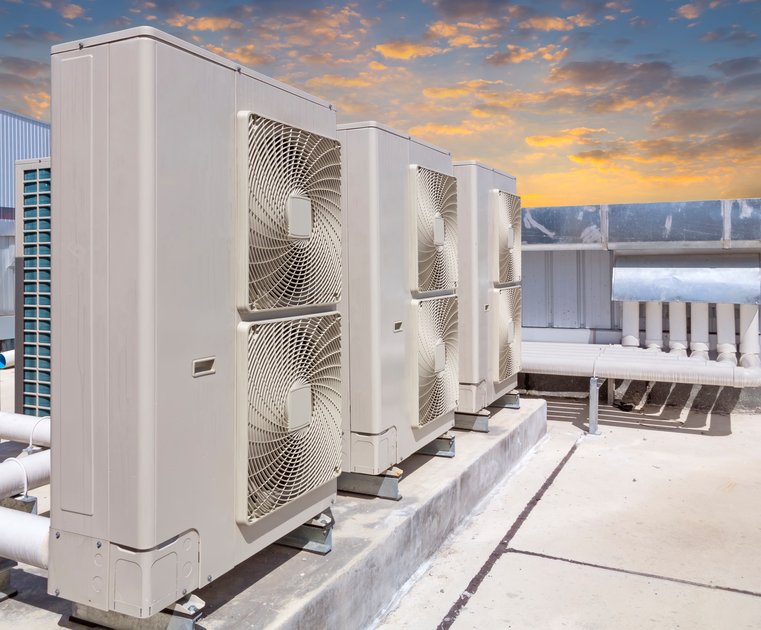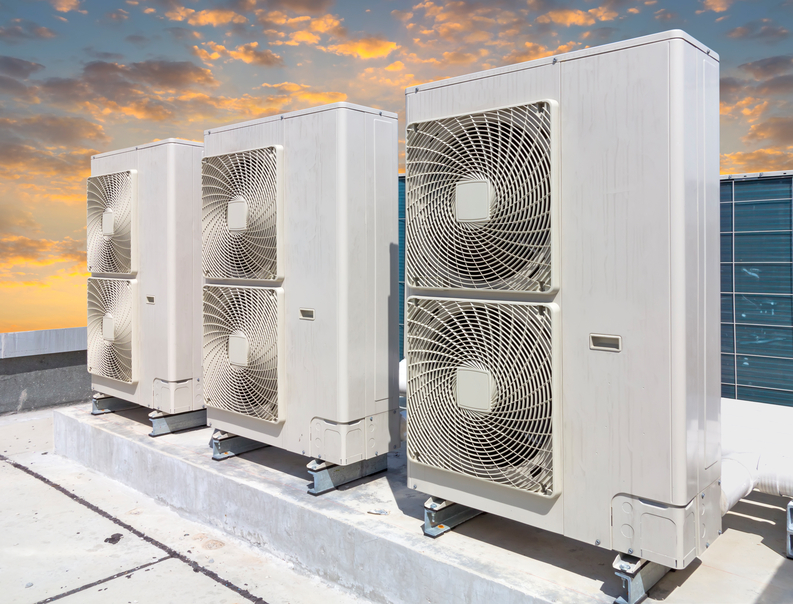HVAC Applications 15 PDH Discount Package
Commercial Heat Pump Water Heaters (M02-034)
Heating and Cooling System Upgrades (M03-022)
HVAC Design Considerations for Corrosive Environments (M03-012)
All About Gas Fireplaces (M03-031)

This online engineering PDH course provides an overview of various TES technology options and discusses their inherent pros and cons.
Thermal energy storage (TES) system is a load shifting strategy for creation of cooling to off-peak hours. In a TES system, a storage media is cooled during periods of low cooling demand and the stored cooling is used later to meet air-conditioning load or process cooling loads. Operating refrigeration chillers at night and displacing energy use from peak (day time) to off-peak periods when the energy is at a lower cost is the primary objective of TES system.
As a proven technology, chilled water or ice thermal storage systems supply the desired reliability for high air conditioning availability during peak hours and can substantially cut operating costs and reduces capital outlays when systems are suitably designed. It offers building owners the potential for substantial operating cost savings by using off-peak electricity to produce chilled water or ice for use in cooling during peak-hours.
This 4 PDH online course is applicable to architects, air-conditioning engineers, controls engineers, contractors, environmentalists, energy auditors and loss prevention professionals. It is assumed that all the readers know the basic functioning of the air conditioning system.
This PE continuing education course is intended to provide you with the following specific knowledge and skills:
- Overview of thermal energy storage systems
- Understanding chilled water storage systems
- Understanding ice thermal storage systems
- Selecting a right TES system
- Familiarizing with district cooling system
In this professional engineering CEU course, you need to review the course document titled, "Air Conditioning with Thermal Energy Storage".
Upon successful completion of the quiz, print your Certificate of Completion instantly. (Note: if you are paying by check or money order, you will be able to print it after we receive your payment.) For your convenience, we will also email it to you. Please note that you can log in to your account at any time to access and print your Certificate of Completion.

This online engineering PDH course presents an overview of commercial heat pump water heaters (HPWHs) applications. In today's industry, HPWH's are viewed as an effective and efficient method to provide hot water for commercial buildings. The system uses a water-heating heat pump to move heat from a cool reservoir, such as air, and transfer this heat into water. In addition this course illustrates the benefits and energy savings behind this technology, explains how to properly size an HPWH system and highlights the costs associated with the installation of HPWHs.
This 2 PDH online course is applicable to mechanical engineers, designers, contractors, building professionals, and all personnel interested in gaining a better understating of HPWH.
This PE continuing education course is intended to provide you with the following specific knowledge and skills:
- Understanding the principles of operation behind HPWH
- Knowing the benefits and energy savings of HPWH
- Familiarizing with the implementation barriers of HPWH
- Learning how to size an HPWH system
- Learning about the design and installation considerations associated with HPWH
- Understanding with the cost considerations associated with the installation of HPWH
In this professional engineering CEU course, you need to review "Commercial Heat Pump Water Heaters "of the Department of Energy (DOE) and Federal Technology Alert (FTA) publication.
Upon successful completion of the quiz, print your Certificate of Completion instantly. (Note: if you are paying by check or money order, you will be able to print it after we receive your payment.) For your convenience, we will also email it to you. Please note that you can log in to your account at any time to access and print your Certificate of Completion.

This online engineering PDH course identifies the opportunities for improving the performance of the heating and cooling system based on the type of system that is in place.
Heating and cooling systems are the largest single consumers of energy in buildings. These systems condition the air within a building so that occupants are comfortable. Heating and cooling systems consist mainly of chillers, boilers, cooling towers, and pumps. There are central heating and cooling systems, and unitary systems that combine heating and cooling. Opportunities exist for improvement to both central and unitary systems.
This 3 PDH online course is applicable to engineers, contractors, designers and other technical professionals who are involved in the retrofit of existing heating and cooling systems.
This PE continuing education course is intended to provide you with the following specific knowledge and skills:
- Understanding the best opportunities available for upgrading central cooling systems including chillers, cooling towers, water side economizers and pumps
- Understanding the best opportunities available for upgrading central heating systems including boilers and furnaces
- Understanding the best opportunities available for unitary systems including packaged or rooftop units, split system packaged units, air source heat pumps and water loop heat pump systems
- Learning about new strategies aimed at saving energy such as geothermal heat pumps, district cooling and heating, radiant heating and cooling, cool storage, high temperature difference distribution, evaporative cooling, and non-electric cooling
In this professional engineering CEU course, you need to review "Heating and Cooling System Upgrades" of the Energy Star Building Manual. (Energy Star is a joint program of the U.S. Environmental Protection Agency and the U.S. Department of Energy).
Upon successful completion of the quiz, print your Certificate of Completion instantly. (Note: if you are paying by check or money order, you will be able to print it after we receive your payment.) For your convenience, we will also email it to you. Please note that you can log in to your account at any time to access and print your Certificate of Completion.

This online engineering PDH course discusses the HVAC design considerations for corrosive environments.
Many emerging HVAC markets have a majority of their populations located in coastal areas. This leads to an increased number of air conditioning applications located in potentially corrosive environments. Environmental factors such as salt mist in sea side locations, add to the corrosive environments. It's not hard to see that HVAC equipment especially cooling and condenser coils are under threat of accelerated degradation. Corroded HVAC coils not only diminish the heat transfer but also increase the operational costs and the maintenance bills. Prevention is much cheaper than replacing coils or the entire system.
Other than the HVAC equipment, the indoor space equipment is also susceptible to corrosive effects. Over time, even extremely low levels of Airborne Molecular Contamination (
This 3 PDH online course is applicable to HVAC engineers, controls engineers, architects, contractors, environmentalists and loss prevention professionals who are interested in gaining an understanding in designing HVAC system in corrosive environments.
This PE continuing education course is intended to provide you with the following specific knowledge and skills:
- Knowing the principle of corrosion
- Understanding the potential corrosive environments
- Familiarizing with the four (4) levels of corrosion severity established by Instrument Society of America (ISA)
- Knowing the three (3) steps identified for corrosion prevention
- Learning two most common techniques available to deal with low-level airborne contamination; 1) particle removal filtration and 2) gas-phase (dry scrubbing) filtration
- Understanding importance of building pressurization and its impact on energy use
- Learning how to protect HVAC equipment with different types of coatings
In this professional engineering CEU course, you need to review the course document titled, "HVAC Design Considerations for Corrosive Environments".
Upon successful completion of the quiz, print your Certificate of Completion instantly. (Note: if you are paying by check or money order, you will be able to print it after we receive your payment.) For your convenience, we will also email it to you. Please note that you can log in to your account at any time to access and print your Certificate of Completion.

This online engineering PDH course presents the basics of gas fireplaces and briefly describes their different types, venting systems, efficiency ratings, ignition and controls, as well as their heat exchange and transfer. It also describes what to look for in a safe, energy-efficient gas fireplace as well as the problems that can be encountered with certain technologies. This course also provides information about where to locate the fireplace for maximum benefit and efficiency.
Changes in the way houses are built and renovated have made most contemporary homes incompatible with conventional wood-burning fireplaces. Most notably, the increased insulation and improved air-tightness of today's homes run counter to the large amounts of air required by conventional wood fireplaces. Such fireplaces are also extremely inefficient and produce high levels of harmful emissions, which pollute outdoor air and can have dangerous effects on indoor air quality. Some new fireplace designs offer a safe, energy-efficient and environmentally friendly alternative to conventional wood fireplaces.
This 3 PDH online course is applicable to engineers, architects, designers, contractors, homeowners, and gas fireplace manufacturers.
This PE continuing education course is intended to provide you with the following specific knowledge and skills:
-
Understanding the different types of gas fireplaces and their venting systems
-
Familiarizing with common efficiency ratings
-
Familiarizing with different types of ignitions and controls
-
Understanding the basics of heat exchange and transfer
-
Knowing where to locate a fireplace for maximum benefit
-
Understanding the safety tips for operating a gas fireplace
-
Learning how to use the gas fireplace efficiently
In this professional engineering CEU course, you need to review the publication "All About Gas Fireplaces" by the Office of Energy Efficiency of the Natural Resources Canada, revised March 2004.
Upon successful completion of the quiz, print your Certificate of Completion instantly. (Note: if you are paying by check or money order, you will be able to print it after we receive your payment.) For your convenience, we will also email it to you. Please note that you can log in to your account at any time to access and print your Certificate of Completion.